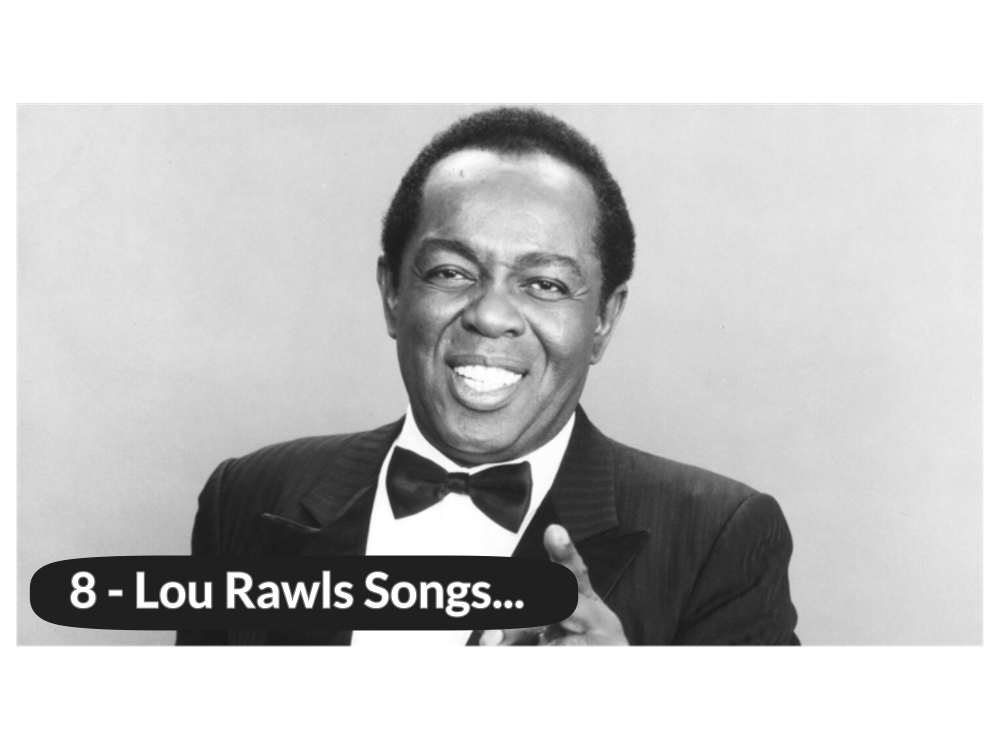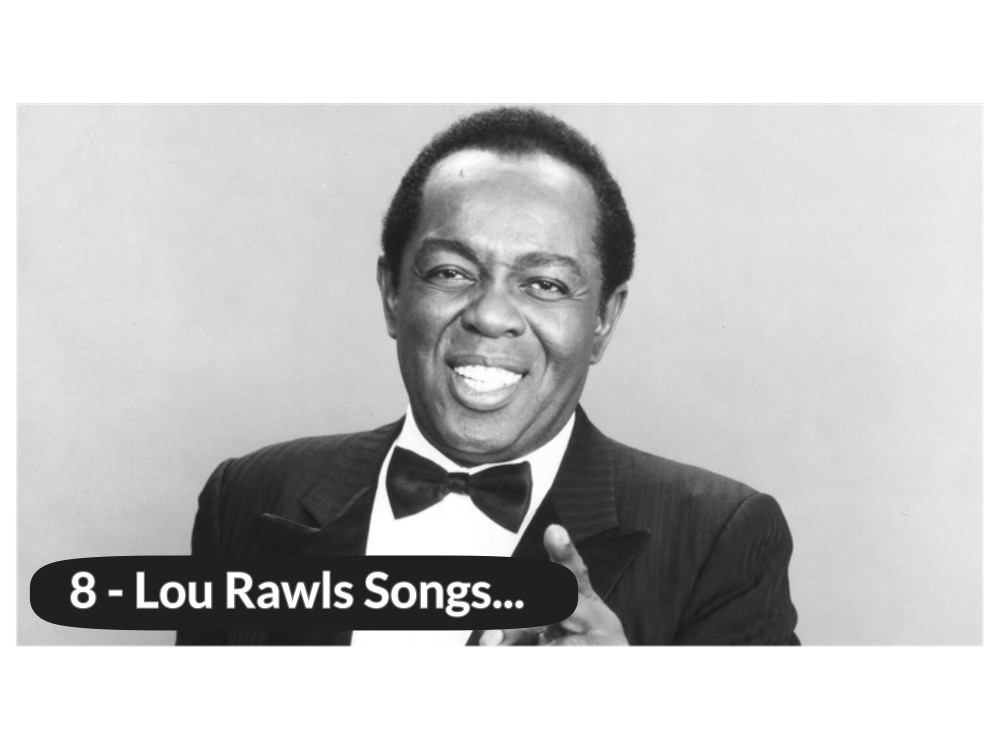-
 play_arrow
play_arrow
Praise 24/7 NO Today's Best Gospel

(ThyBlackMan.com) Lou Rawls had that voice—the kind that made you stop whatever you were doing and just listen. Smooth as aged whiskey, rich with soul, and wrapped in a confidence that didn’t need to show off. He could make you feel like he was talking directly to you, whether he was laying down a love ballad or unpacking hard truths about life.
We all know the classics—“You’ll Never Find Another Love Like Mine” being the big one—but Rawls’ catalog goes so much deeper than his biggest chart hits. If you take a little time to dig, you’ll find songs that are raw, reflective, and surprisingly relevant even today. Whether you’re a longtime fan or just getting to know him, these eight tracks deserve your time. Each one captures a different side of Lou: the storyteller, the romantic, the philosopher, the realist.
So let’s press play, and rediscover—or maybe discover for the first time—just how versatile and timeless Lou Rawls really was.

1. “Dead End Street”
“Dead End Street” is not only one of Lou Rawls’ most socially conscious songs—it’s one of the boldest tracks in 1960s soul to combine raw social commentary with genre-defying musicality. What sets this song apart is how it blends spoken-word storytelling with funk-infused jazz arrangements and blues phrasing, creating a track that could easily sit alongside Gil Scott-Heron’s earliest works.
The spoken-word intro, stretching over a minute, feels like a monologue from a stage play. Rawls recounts a scene so vividly that you can practically smell the tenement stairwells and feel the weight of financial struggle in every syllable. His delivery is theatrical yet grounded, allowing listeners to visualize the characters he speaks of, especially the struggling mother and weary father trying to keep their family afloat.
As the music kicks in, it doesn’t just serve as a backdrop—it becomes part of the narrative. The horn section bursts forth with urgency, while the rhythm section grooves like a street marching band. The contrast between the despair of the lyrics and the vitality of the music encapsulates the duality of life in the inner city: hardship coexisting with resilience and pride.
In a modern context, “Dead End Street” could be seen as an early precursor to hip-hop’s narrative drive. Lou Rawls gave us something between sermon and soul, laying the blueprint for artists who would later use music to speak hard truths. It’s not just a time capsule—it’s a testament to the staying power of storytelling done right.
2. “Love Is a Hurtin’ Thing”
“Love Is a Hurtin’ Thing” wasn’t just a hit—it was Lou Rawls’ breakthrough moment that announced his arrival as a force in soul music. But the track’s brilliance runs deeper than chart success. It’s a masterclass in emotional control, where heartbreak becomes a declaration of self-awareness rather than victimhood.
The arrangement may feature the familiar textures of 60s orchestral soul—bright brass, sweeping violins, tight rhythm guitars—but it’s the undercurrent of tension in Rawls’ voice that grabs you. There’s no melisma, no vocal gymnastics. Instead, every phrase is deliberate, as if he’s chewing over each word with the weariness of someone who’s been through it all. “Yes, love is a hurtin’ thing/Oh, love is a hurtin’ thing” he admits, and you can hear the echo of those tears.
It’s also one of the few soul songs of its time that acknowledges emotional vulnerability in men without shame. At a time when masculinity was often portrayed as stoic and invulnerable, Rawls’ willingness to lay bare his pain marked him as a deeply human performer. He wasn’t just singing about love—he was revisiting its scars in real time.
Today, the song resonates for its honesty. It’s one of those rare ballads that doesn’t try to solve anything; it just tells you the truth. It’s the kind of track that belongs on a rainy-day playlist, a bluesy, bruised gem that reminds you that love, while beautiful, often comes at a cost.
3. “Groovy People”
“Groovy People” captures Lou Rawls at the intersection of charisma and groove. Coming out of the Philly Soul hit factory helmed by Gamble & Huff, this track was tailor-made to showcase Rawls’ charm—light-hearted, effortlessly cool, and rich with social subtext. It’s not just a funky track to nod your head to; it’s a declaration of personal boundaries and a celebration of keeping good company.
Underneath the disco-adjacent rhythm section is a set of values that feel refreshingly grown. Rawls is tired of ego, weary of phonies, and in search of “groovy people” who are kind, simple, and authentic. It’s a quietly radical statement for the time, wrapped in playful lyrics and danceable basslines. He sings like he’s giving relationship advice at a dinner party: firm but fun, smooth but serious.
The vocal layering in the background adds extra warmth, and the use of call-and-response brings listeners directly into the room with him. It’s intimate in a communal way—the kind of song that brings people together without requiring them to say much. The production doesn’t overpower; it supports Rawls like an armchair supports a storyteller.
In today’s fractured social media world, “Groovy People” might be more essential than ever. It’s the soundtrack for curating your circle and letting the fake energy fall away. Play it at your next house gathering or listen solo when you need a reminder that choosing peace is its own kind of party.
4. “You Made Me So Very Happy”
Lou Rawls’ rendition of “You Made Me So Very Happy” feels like emotional closure wrapped in satin. It’s not the most famous version of this song, but it might be the most heartfelt. Unlike the more bombastic version by Blood, Sweat & Tears, Rawls brings a quiet dignity and deep gratitude that only a seasoned voice like his could deliver.
There’s a tempo shift that matters—Rawls slows it down just enough to give each word meaning, allowing him to stretch the phrase “I’m so glad you came into my life” into something reverent. He doesn’t perform this song—he offers it, like a bouquet of memory and thanks. It’s not just about romantic joy; it’s about recognizing someone who changed you at your core.
The orchestration is equally respectful. The piano trickles in softly, followed by restrained string flourishes and mellow horns. Everything feels delicately placed. It’s music that knows its role—to elevate the voice, not compete with it. That sense of balance is what turns this track into a soulful meditation rather than a power ballad.
Listening now, you can’t help but think of those people—lovers, friends, mentors—who left a permanent mark on your life. Rawls gives voice to that reflection with poise and soul. In a world that often rushes past emotions, “You Made Me So Very Happy” is a necessary pause to breathe, appreciate, and say, “thank you” in the most timeless way possible.
5. “Lady Love”
If there’s one song that defines Rawls’ romantic side, it’s “Lady Love.” This track walks the fine line between classy and seductive, and it does so with such finesse that it could only be Lou. From the gentle piano intro to the velvet-smooth verses, “Lady Love” is adult R&B at its finest.
The lyrics are pure adoration. “Lady Love, your love is peaceful like a summer’s breeze,” he croons. But this isn’t just typical praise—it’s appreciation wrapped in emotional depth. He speaks of comfort, calm, and emotional grounding, painting a picture of love as a refuge from life’s chaos. Lou Rawls wasn’t selling fantasy—he was honoring partnership, which makes the song all the more enduring.
Instrumentation-wise, the production is elegant. The strings don’t overwhelm, the piano knows its place, and the rhythm section provides just enough sway to make the track groove without turning it into a slow jam cliché. Everything is balanced—like the love he’s singing about. Rawls’ vocal performance is refined and emotionally restrained, delivering romance with the wisdom of experience, not youthful impulse.
What also sets this ballad apart is its lyrical maturity. This isn’t puppy love—it’s grown-folk love. There’s admiration here, but also a quiet recognition of everything that makes a woman his “Lady Love”—loyalty, peace, grace, and presence. In a world where modern R&B often leans heavily into sensuality, Rawls delivers intimacy through sincerity. It’s why the song still plays beautifully in weddings, anniversaries, and personal moments today.
6. “Tobacco Road”
“Lou Rawls Live!” may be one of his most critically acclaimed albums, but his studio version of “Tobacco Road” is where the magic really begins. This blues-soaked tale of hardship and redemption finds Rawls digging deep into his gospel and blues roots, telling a story that sounds autobiographical even if it wasn’t written by him.
Lyrically, it’s a stark portrayal of poverty and resilience. “I was born in a bunk,” he declares in the first line, and from there, it only gets more vivid. The images he paints are grim—a leaky shack, a neighborhood on the brink—but Rawls never lets the story drown in despair. There’s a grit and defiance in his tone that screams survival. He’s not ashamed of where he came from; he’s proud to have made it out.
Musically, the song leans heavily on the blues—with a stripped-down arrangement that allows Rawls’ vocals to take center stage. The horns moan and the bassline slinks, but it’s that voice—world-weary and wise—that pulls you in. There’s also a subtle jazz swing in the instrumentation, which softens the hard edge of the lyrics and gives the song more emotional versatility.
Today, “Tobacco Road” feels more like a protest anthem than ever. It speaks to anyone who’s ever had to claw their way out of a hard life, whether in rural towns or inner-city blocks. Rawls doesn’t glorify the struggle—he just tells it like it is. That honesty is why the song continues to resonate. It’s a reminder that we should never forget where we came from, even when we’re trying hard to leave it behind.
Finish story here; 8 Lou Rawls Songs That Cement His Legacy in Soul and R&B History.
Written by: Black Gospel Radio
Similar posts
-

Praise 24/7 Commercial Free
For every Show page the timetable is auomatically generated from the schedule, and you can set automatic carousels of Podcasts, Articles and Charts by simply choosing a category. Curabitur id lacus felis. Sed justo mauris, auctor eget tellus nec, pellentesque varius mauris. Sed eu congue nulla, et tincidunt justo. Aliquam semper faucibus odio id varius. Suspendisse varius laoreet sodales.
close Top popular

The Science of Happiness – Exploring Factors for Well-Being

Balancing Act: Prioritizing Your Well-Being in a Busy World

Overcoming Procrastination – Strategies for Productivity and Success

Unlocking Hidden Potential – A Guide to Personal Growth

Mindful Living – Cultivating Presence in the Modern Era

CONTACT US
- info@praise247no.com
FOLLOW US
- Praise247NO
- Praise247NO
- Praise247NO
Copyright 2024 Praise247no.com - All Rights Reserved.



Post comments (0)